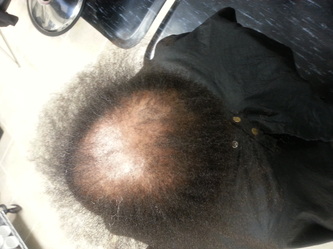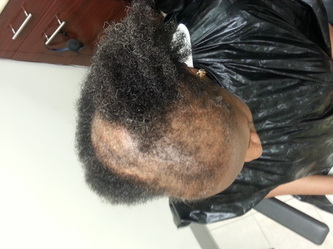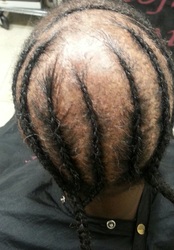Understanding Hair Loss
"A Major Hair Problem in Men and Women Today"
Medical conditions
A variety of medical conditions can cause hair loss, including:
A variety of medical conditions can cause hair loss, including:
- Thyroid problems. The thyroid gland helps regulate hormone levels in your body. If the gland isn't working properly, hair loss may result.
- Alopecia areata. This disease occurs when the body's immune system attacks hair follicles — causing smooth, roundish patches of hair loss.
- Scalp infections. Infections, such as ringworm, can invade the hair and skin of your scalp, leading to hair loss. Once infections are treated, hair generally grows back.
- Other skin disorders. Diseases that can cause scarring, such as lichen planus and some types of lupus, can result in permanent hair loss where the scars occur.
Shadonna Bethel, a dedicated professional undergoing certification in Trichology at the World Trichology Institute, is on a mission to help individuals combat hair loss and provide valuable information on maintaining healthy hair. With her extensive knowledge, clients can gain a better understanding of effective hair care practices and learn about the do's and don'ts for maintaining a healthy head of hair.
Trichologists are specialists in hair and scalp disorders, with the term "Trichology" originating from the ancient Greek word "Trikhos" meaning hair. The study of hair loss and hair care began in the 1860s at a London barbershop under Professor Wheeler. In 1902, this interest in hair disorders evolved into the field of Trichology, and the Institute of Trichologists was established. A qualified Trichologist is equipped to identify and treat various hair and scalp issues, including hair loss, hair shaft breakage, scalp disorders, and scalp environment concerns. They have undergone extensive study and successfully completed recognized trichology education programs.
If you experience sudden excessive hair loss from the scalp, severe breakage after a chemical service, the appearance of a bald patch, or itching and excessive scaling from the scalp, it is recommended to consult a Trichologist. Common problems such as dandruff, psoriasis, seborrhea, excessive hair loss, and baldness can be addressed with professional advice and, where possible, treatment.
Trichological treatments may include hair detoxification, scalp exfoliation, stress therapy treatments such as Electro Therapy, low light laser therapy, and the application of topical formulations to the hair and scalp, along with home maintenance. However, it's important to note that optimal results are often achieved when poor nutritional diets and unhealthy lifestyles are addressed and eliminated.
If a Trichologist suspects underlying health issues such as hormonal imbalance, thyroid problems, diabetes, anemia, lupus, poisoning from X-rays, pesticides, lead, or mercury, thrush, kidney or liver problems, they would refer you to your physician for a blood test and a complete medical check-up.
For further information on Trichology, you can visit The Trichological Society's website, where you can access additional resources and insights. Shadonna Bethel’s dedication to her certification and her commitment to helping individuals combat hair loss make her a valuable resource in the field of Trichology.
Trichologists are specialists in hair and scalp disorders, with the term "Trichology" originating from the ancient Greek word "Trikhos" meaning hair. The study of hair loss and hair care began in the 1860s at a London barbershop under Professor Wheeler. In 1902, this interest in hair disorders evolved into the field of Trichology, and the Institute of Trichologists was established. A qualified Trichologist is equipped to identify and treat various hair and scalp issues, including hair loss, hair shaft breakage, scalp disorders, and scalp environment concerns. They have undergone extensive study and successfully completed recognized trichology education programs.
If you experience sudden excessive hair loss from the scalp, severe breakage after a chemical service, the appearance of a bald patch, or itching and excessive scaling from the scalp, it is recommended to consult a Trichologist. Common problems such as dandruff, psoriasis, seborrhea, excessive hair loss, and baldness can be addressed with professional advice and, where possible, treatment.
Trichological treatments may include hair detoxification, scalp exfoliation, stress therapy treatments such as Electro Therapy, low light laser therapy, and the application of topical formulations to the hair and scalp, along with home maintenance. However, it's important to note that optimal results are often achieved when poor nutritional diets and unhealthy lifestyles are addressed and eliminated.
If a Trichologist suspects underlying health issues such as hormonal imbalance, thyroid problems, diabetes, anemia, lupus, poisoning from X-rays, pesticides, lead, or mercury, thrush, kidney or liver problems, they would refer you to your physician for a blood test and a complete medical check-up.
For further information on Trichology, you can visit The Trichological Society's website, where you can access additional resources and insights. Shadonna Bethel’s dedication to her certification and her commitment to helping individuals combat hair loss make her a valuable resource in the field of Trichology.




